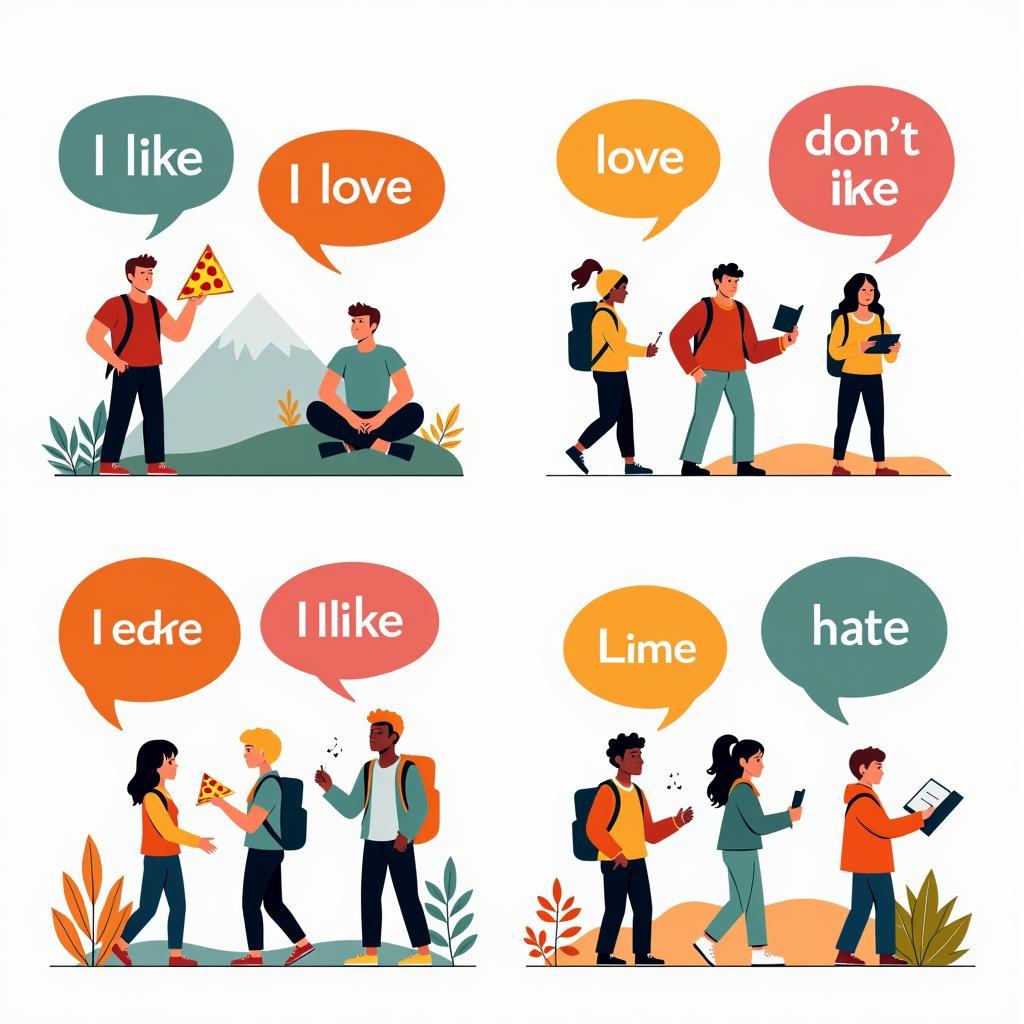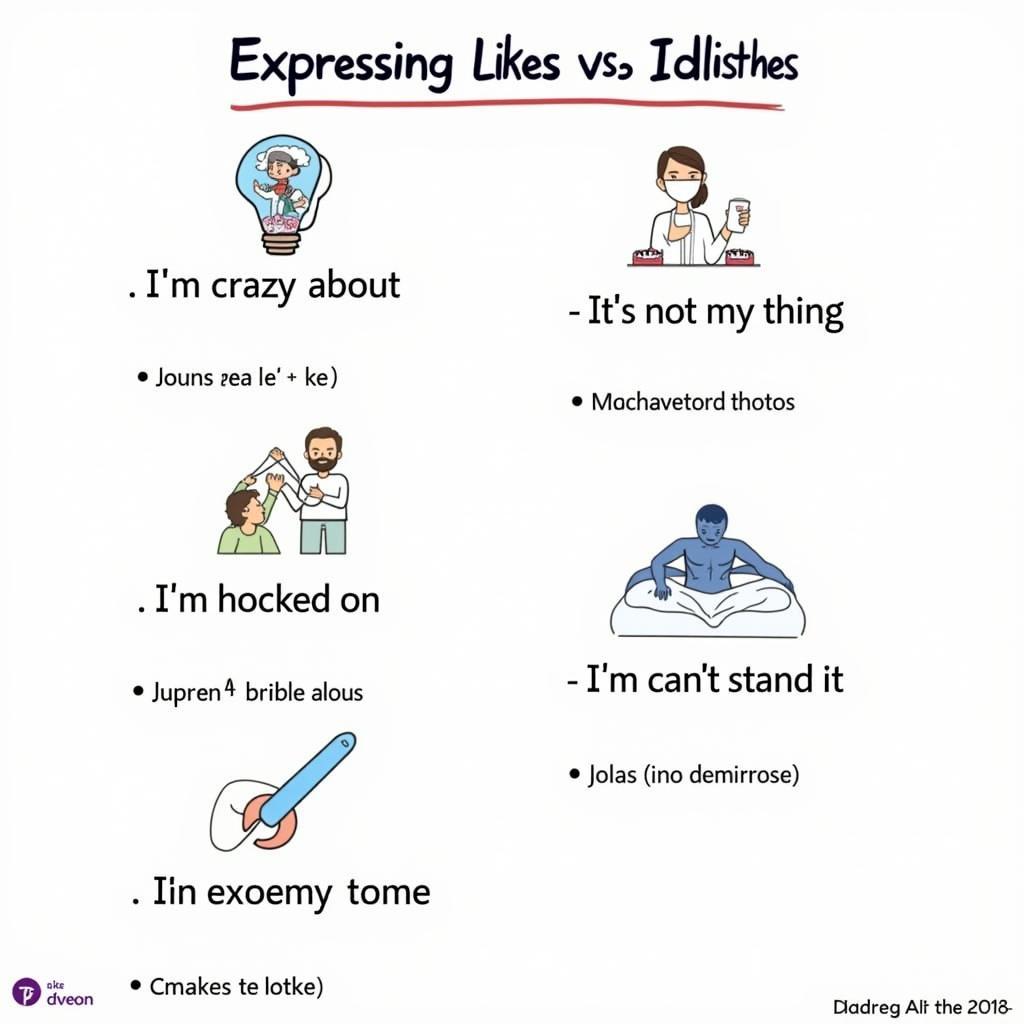Expressing your likes and dislikes is a fundamental part of communication. Whether you’re chatting with a friend, attending a networking event, or expressing yourself online, knowing how to convey your preferences in English is essential. This article will equip you with various ways to articulate your likes and dislikes, from simple expressions to more nuanced phrases, ensuring you can confidently navigate any social situation.
Mastering the Basics: Simple Expressions of Likes and Dislikes
Let’s start with the foundation. “I like” and “I don’t like” are your go-to phrases. They’re simple, direct, and universally understood. For example, “I like pizza” or “I don’t like spiders.” Easy, right? You can amplify these by adding adverbs like “really,” “very,” or “absolutely.” “I really like hiking” shows a stronger preference than just “I like hiking.”
You can also use “I love” to express strong affection. “I love spending time with my family” conveys a deeper level of enjoyment. Conversely, “I hate” signifies strong dislike. Be mindful though, “hate” can sound quite intense, so use it sparingly. “I dislike” is a gentler alternative. For example, “I dislike rainy weather.”
 Diễn đạt sở thích đơn giản
Diễn đạt sở thích đơn giản
Remember the importance of expressing your interests! It’s a key factor in building relationships, as explored in tại sao con trai thích con gái.
Taking it Further: More Expressive Phrases
While the basics are crucial, expanding your vocabulary will allow for more nuanced expression. Consider using phrases like “I’m fond of,” “I’m keen on,” or “I’m a fan of” to express your liking for something. For example, “I’m fond of classical music” or “I’m keen on trying new recipes.” These phrases add a touch of sophistication to your conversation.
On the other hand, to express dislike, you can use phrases like “I’m not a big fan of,” “I’m not keen on,” or “I’m not really into.” For example, “I’m not a big fan of horror movies” or “I’m not really into social media.” These alternatives soften the tone compared to using “hate” or “dislike.”
Exploring Specific Preferences: Talking About Hobbies and Interests
Discussing hobbies and interests often requires more detailed language. You can use phrases like “I enjoy,” “I’m passionate about,” or “I’m interested in.” For instance, “I enjoy playing the guitar,” “I’m passionate about photography,” or “I’m interested in learning Spanish.”
 Mô tả sở thích chi tiết
Mô tả sở thích chi tiết
For dislikes, consider “I find it boring,” “I’m not good at,” or “It’s not my cup of tea.” “I find it boring to watch golf,” or “It’s not my cup of tea” express dislike more subtly.
Expressing your preferences can sometimes feel as complex as understanding relationships. Check out mộng thích thanh từ for a different perspective on connections.
Using Idioms to Spice Up Your Language
Idioms can add color and personality to your conversations. For instance, “I’m crazy about” expresses strong liking, while “It’s not my thing” conveys dislike. Using idioms can make your English sound more natural and engaging.
Adding Nuance with Adjectives and Adverbs
Adjectives and adverbs are powerful tools for expressing the intensity of your feelings. Words like “absolutely,” “completely,” “totally,” “utterly,” “slightly,” “somewhat,” and “moderately” allow you to fine-tune the level of your liking or disliking.
 Sử dụng thành ngữ và từ ngữ
Sử dụng thành ngữ và từ ngữ
You might find the diverse interests of young people intriguing. Learn more about what the younger generation enjoys in giới trẻ hiện nay thích gì. Understanding these preferences can help you connect with others more effectively.
Conclusion
Mastering various ways to express your likes and dislikes is crucial for effective communication in English. From basic expressions to nuanced phrases and idioms, these tools empower you to connect with others, share your passions, and build meaningful relationships. Remember, clear and confident communication is key to navigating social situations successfully, whether you’re discussing your favorite movie or your least favorite food. By incorporating these techniques into your everyday conversations, you’ll not only enhance your communication skills but also deepen your understanding of others.
FAQ
-
What are some basic ways to express likes and dislikes?
Use “I like,” “I don’t like,” “I love,” and “I hate.” -
How can I express stronger preferences?
Add adverbs like “really,” “very,” or “absolutely.” -
What are some alternative phrases for “I like”?
“I’m fond of,” “I’m keen on,” and “I’m a fan of.” -
What are some alternative phrases for “I don’t like”?
“I’m not a big fan of,” “I’m not keen on,” and “It’s not my cup of tea.” -
How can I express my hobbies and interests in more detail?
Use phrases like “I enjoy,” “I’m passionate about,” and “I’m interested in.” -
What are some idioms related to likes and dislikes?
“I’m crazy about” and “It’s not my thing.” -
How can I fine-tune the intensity of my feelings?
Use adjectives and adverbs like “absolutely,” “slightly,” and “moderately.”
More Resources
You can also find more information about related topics on our website:
Need Help?
Contact us for support:
- Phone: 0915063086
- Email: [email protected]
- Address: LK 364 DV 08, Khu đô thị Mậu Lương, Hà Đông, Hà Nội 12121, Việt Nam
We have a 24/7 customer support team.